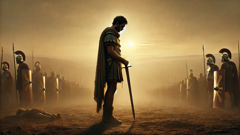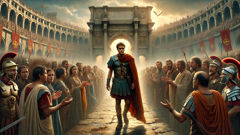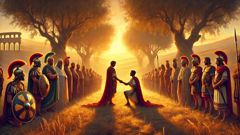Introduction
In the ancient lands of Italy, before marble columns cast their long shadows over the Roman Forum and before Caesar’s banners rose above seven hills, Rome was a fledgling city struggling for survival. Its people clung fiercely to traditions, their lives shaped by the iron grip of honor, family, and loyalty. These were days when myth and reality danced close—when the fate of cities sometimes hung not on the might of armies, but on the courage of a few brave souls. Among the countless stories woven into Rome’s origins, none stirs the heart quite like the legend of the Horatii and the Curiatii. This tale isn’t just about war or politics—it’s about the price of peace and the sacrifices demanded by honor. It’s a story where the battlefield shrinks from open fields to a single, brutal contest, with two families at its heart: the Roman Horatii, proud brothers known for their unwavering loyalty, and the Alban Curiatii, equally matched in valor and kinship. When a bitter rivalry flared between Rome and her neighbor Alba Longa, both cities faced devastation if war continued. Their leaders, seeking a different path, agreed on a solemn ritual combat: three brothers from each side would fight to decide the fate of their nations. As dawn broke over a world teetering between peace and ruin, all eyes turned to the chosen six. Through dust and dawn’s golden light, we see not just warriors, but sons, brothers, and lovers—each carrying their city’s hopes and their family’s pride. The legend that unfolds is one of love entangled with duty, of grief entwined with victory. It’s a window into the soul of ancient Rome, where the destinies of many rested on the blood and resolve of a few. Journey back to those primal days, to the olive groves and sacred fields of Latium, and witness the legend that shaped a city’s soul.
The Shadow of War and the Pact of Blood
The rivalry between Rome and Alba Longa simmered for years, sometimes boiling over in skirmishes that left olive groves trampled and rivers stained with blood. These were not distant enemies: Rome itself traced its roots to Alba, both cities born of the same mythic lineage, both fierce in pride and purpose. Yet ancient grievances festered. Alba’s king, Gaius Cluilius, believed Rome’s ambition threatened the balance of Latium. Rome’s leader, Tullus Hostilius, newly crowned and eager to prove his mettle, saw in Alba a challenge that couldn’t be ignored. The threat of all-out war loomed like a thunderhead.

Before the full fury of battle could erupt, envoys from both sides met in the shadow of a sacred oak, seeking an end that would spare their people. The solution they forged was simple and terrible: let each city choose three of its bravest sons to fight in ritual combat. The city whose champions prevailed would claim victory; the loser would submit. On the surface, it was a merciful pact, sparing thousands. But for the families chosen, it was a sentence sealed by fate.
From Rome stepped forward the Horatii: Publius, Marcus, and Titus. These brothers were famed for their unity and strength, but also for ties of love—Titus was betrothed to Camilla, sister to one of the Curiatii. Alba Longa’s champions were the Curiatii: Aulus, Gaius, and Lucius, as close as their Roman counterparts, and just as beloved. The bond between the families, once a thread of peace, now became a cord of tragedy.
The appointed day dawned beneath a sky stained with hope and dread. On a broad field between the cities, the armies assembled in silence, their banners fluttering like nervous hearts. The air itself seemed to hold its breath. At the center, the six champions stood, shining in polished bronze and iron, each aware that his sword might bring glory—or grief. The crowd receded into a blur. What mattered now was family, city, and the pact sealed by the gods.
A priest stepped forward, invoking Jupiter’s blessing and warning that betrayal of the pact would bring ruin. The combatants clasped hands one last time with their kin. Camilla, torn between love and loyalty, caught Titus’s gaze across the clearing. Her tears, shining in the morning light, seemed to hang suspended as time itself slowed. When the signal sounded, swords flashed and the ritual began—a dance of death that would shape the fate of Latium forever.
The Duel of Brothers: Sacrifice and Survival
The clash erupted with a fury that startled even the most seasoned warriors. Metal rang on metal, shields splintered, and the field quickly became a maelstrom of sweat, blood, and desperate breath. The Horatii and Curiatii fought not only for their own lives, but for the honor of two cities, each blow echoing with the hopes and fears of thousands. At first, the contest seemed balanced—each brother matched in skill and resolve. The watching armies dared not cheer nor weep, so great was the awe that stilled their hearts.

In the first furious moments, tragedy struck the Romans. Publius, the eldest Horatius, was caught off guard as Lucius Curiatius’s blade slipped past his guard. With a gasp and a spray of crimson, he fell to the earth. A heartbeat later, Marcus Horatius lunged in a reckless bid for vengeance, but Aulus Curiatius met him with unflinching resolve. The two men crashed together, and when they parted, Marcus too lay motionless in the dust. It happened so quickly—two brothers lost in a matter of breaths. Only Titus remained to carry Rome’s banner.
Titus staggered back, pain and grief nearly overwhelming him. The Curiatii, though victorious in those opening blows, were not unscathed; each bore wounds, one limping heavily, another clutching his side, blood trickling between his fingers. Seeing their opponent alone, the three Alban brothers pressed forward as one, believing the fight all but won.
But Titus was no ordinary warrior. Gritting his teeth, he feigned retreat, running across the field. The Curiatii pursued, but their wounds slowed them, and they soon straggled apart. Seizing his chance, Titus wheeled around and faced the first brother to catch him—Lucius, already weakened by a leg wound. With a swift strike, Titus dispatched him. The second, Gaius, arrived moments later, breath ragged and sword arm drooping. Titus met him with the full force of his fury, sending him crashing to the ground. Only Aulus remained, horrified to see his brothers slain.
The armies stood transfixed, barely breathing as Titus—bloodied, exhausted, but resolute—faced his final foe. The two circled, eyes locked. With a desperate cry, Aulus attacked, but Titus anticipated his move. Their swords met once, twice, then Aulus faltered. With one last surge of strength, Titus struck him down. Silence fell over the field, heavy and absolute. Rome had triumphed—but at a cost that would haunt them all.
Aftermath: The Price of Victory
The hush that fell after the duel seemed endless. Then a collective gasp rose from the Roman ranks as they realized what had happened: Rome was victorious, but only one of her champions remained standing. The Alban soldiers, devastated, cast down their weapons in surrender. Alba Longa’s king stepped forward to kneel before Tullus Hostilius, sealing the pact. Rome’s banners rose, but the celebration was muted by the memory of the blood that had been spilled.

Titus Horatius returned to Rome as a hero, but his triumph was a hollow one. The city welcomed him with laurel wreaths and songs, but Titus felt only the weight of his loss. His brothers were gone, and the woman he loved, Camilla, was shattered by grief—her brothers had all perished at his hand. As he entered the city gates, Camilla confronted him, her eyes blazing with pain. She cried out against his victory, blaming him for the deaths that had torn her world apart. In a moment of madness and anguish, Titus, unable to bear her reproach or his own grief, lashed out and killed her—one final tragedy in a chain of sorrow.
The Romans were divided. Some hailed Titus as a hero who had saved the city; others condemned him for his crime against Camilla. He was brought before the king and the people for judgment. The law demanded that he pay with his life, but Titus’s father, who had already lost two sons that day, pleaded for mercy. He argued that Titus had acted in defense of Rome’s honor and that his suffering was punishment enough. After deliberation, the people chose to spare Titus, but his soul was forever marked by what he’d done.
In the months that followed, Alba Longa became a vassal of Rome, bound by the blood pact sealed on that fateful field. The people of both cities tried to move on, rebuilding their lives in the shadow of grief and sacrifice. The legend of the Horatii and the Curiatii became more than just a story—it was a lesson carved into the memory of Rome: that peace can be won through courage and sacrifice, but that its price is always paid in flesh and tears.
Conclusion
So the legend of the Horatii and the Curiatii endures—a tale woven from the fibers of history and myth, shaped by the passions of ancient hearts. It’s a story that asks what price we’re willing to pay for peace, and whether true victory ever comes without loss. Through their courage, the Horatii and Curiatii remind us that honor can demand the impossible: to fight those we love for the sake of all we hold dear. Yet in their sorrow, we glimpse the human cost hidden behind every banner raised and every anthem sung. As Rome grew from humble beginnings to empire, this legend echoed in the hearts of its people, a warning and a hope carried through generations. It taught them—and us—that greatness is never simple or bloodless. Sometimes, the bravest acts are those that leave us with scars, both visible and unseen. The olive groves still whisper their names when dusk falls over Latium. And the world remembers that, long ago, three Roman brothers faced three from Alba Longa beneath a golden dawn—not just for glory, but for a future shaped by sacrifice.


















